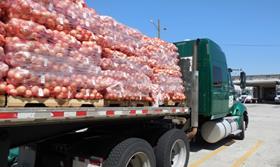
Nogales is widening its lead over South Texas as a crossing point for Mexican fresh fruits and vegetables arriving into the US. For the season running from September 2013 to April 2014, around 37 per cent of Mexican produce that was consumed in North America crossed through Nogales. This compares to around 28 per cent of total volume for the crossing region in the southern Texas towns of Pharr and Progresso.
The information, gathered from the USDA, shows that Nogales saw a 17 per cent increase in produce shipments over the previous season, while other ports remained flat or saw much smaller volume rises.
The Fresh Produce Association of the Americas (FPAA) said the increase is due to several factors, including improvements at the new Mariposa port of entry in Nogales, which have reduced the amount of time a truck has to queue at the border. The number of commercial crossing lanes at Mariposa has been doubled, while Nogales is also set to receive 120 additional customs officers to facilitate trade at the expanded port.
The Arizona Department of Transportation has also made significant improvements on the road leading into the US from the port, including widening and adding additional lanes for vehicles to access the I-19 highway.
“The collective commitment to excellence from supporting agencies like Customs, FDA, USDA and Arizona Department of Agriculture reaffirms the region’s drive to continue to be the premier port of entry for perishable products,” FPAA president Lance Jungmeyer said.
“There has never been a better time to be in the Mexican produce importing business, and Nogales has all the tools needed to continue to capitalise on this growth. Growers in western Mexico continue to invest in new technology and seed varieties to expand their seasons and bring new produce to the market. In the future we probably won’t even see the historical drop-off in the summertime.”
Among the items seeing a notable increase through Nogales are oranges (+295 per cent), seedless watermelons (+78 per cent) and Cantaloupes (+52 per cent).



